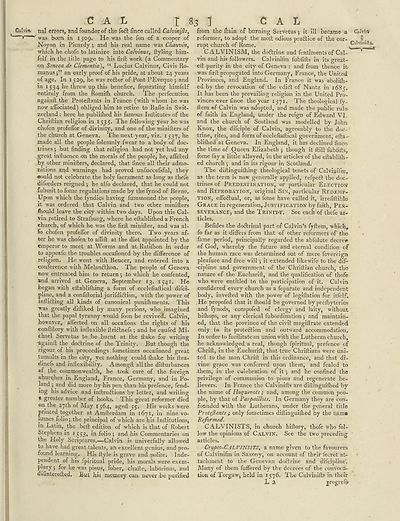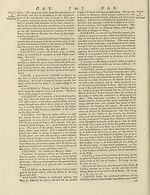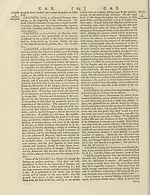Encyclopaedia Britannica, or, a Dictionary of arts, sciences, and miscellaneous literature : enlarged and improved. Illustrated with nearly six hundred engravings > Volume 5, BUR-CHI
(95) Page 83
Download files
Complete book:
Individual page:
Thumbnail gallery: Grid view | List view

CAL r 83 1 CAL
Calvin, nal errors, and founder of the feft fince called Cahinifh,
“^s* ' was born in 1509. He was the fon of a cooper of
Noyon in Picardy ; and his real name was Chauvin,
which he chofe to latinize into Calvinus, ftyling him-
felt in the title page to his fir ft work (a Commentary
on Seneca de dementia'), “ Lucius Calvinus, Civis Ro¬
manes j” an early proof of his pride, at about 24 years
of age. In 1529, he was reftor of Pont PEveque ; and
in 1534 he threw up this benefice, feparating himfelf
entirely from the Romilh church. The perfecution
againft the Proteftants in France (with whom he was
now affociated) obliged him to retire to Bafle in Swit¬
zerland : here he publiftied his famous Inftitutes of the
Chriftian religion in 153 5. The following year he w as
chofen profeflbr of divinity, and one of the minifters of
the church at Geneva. The next year, viz. 1537, he
made all the people folemnly fwear to a body of doc¬
trines ; but finding that religion had not yet had any
great influence on the morals of the people, he, aflifted
by other minifters, declared, that fince all their admo¬
nitions and warnings had proved unfuccefsful, they
«ould not celebrate the holy facrament as long as thefe
diforders reigned; he alfo declared, that he could not
fubmit to fome regulations made by the fynod of Berne.
Upon which the lyndics having fummoned the people,
it was ordered that Calvin and two other minifters
fhould leave the city within two days. Upon this Cal¬
vin retired to Straftmrg, where he eftablifhed a French
church, of which he wras the firft minifter, and was al¬
fo chofen profeflbr of divinity there. Two years af¬
ter he was chofen to aflift at the diet appointed by the
emperor to meet at Worms and at Ratifbon in order
to appeafe the troubles occafioned by the difference of
religion. He went with Beucer, and entered into a
conference with Melancthon. The people of Geneva
now entreated him to return; to which he confented,
and arrived at Geneva, September 13. 1341. He
began with eftablifhing a form of ecclefiaftical difei-
pline, and a confiftorial jurifdiftion, w ith the power of
infli&ing all kinds of canonical punifhments. This
was greatly dilliked by many perfons, who imagined
that the papal tyranny would foon be revived. Calvin,
however, afferted on all occafions the rights of his
confiftory with inflexible ftriclnefs ; and he caufed Mi¬
chael Servetus to be burnt at the flake for writing
againft the doctrine of the Trinity. But though the
rigour of his proceedings fometimes occafioned great
tumults in the city, yet nothing could {hake his ftea-
dinefs and inflexibility. Amongft all the difturbances
©f the commonwealth, he took care of the foreign
churches in England, France, Germany, and in Po¬
land \ and did more by his pen than his prefence, fend¬
ing his advice and inftruftions by letter, and writing
» greater number of books. This great reformer died
on the 27th of May 1564, aged 95. His works were
printed together at Amfterdam in 1671, in nine vo¬
lumes folio; the principal of which are his Inftitutions,
in Latin, the beft edition of which is that of Robert
Stephens in 1553, folio ; and his Commentaries on
the Holy Scriptures.—Calvin is univerfally allowed
to have had great talents, an excellent genius, and pro¬
found learning. His ftyle is grave and polite. Inde¬
pendent of his fpiritual pride, his morals were exem¬
plary ; for he wras pieus, fober, chafte, laborious, and
difinterefted. But his memory can never be purified
Calvinifts.
from the ftain of burning Servetus; it ill became a Calvin7
reformer, to adopt the moft odious practice of the cor¬
rupt church of Rome.
CALVINISM, the doftrine and fentiments of Cal¬
vin and his followers. Calvinifm fubfifts in its great-
eft purity in the city of Geneva : and from thence it
•was firft propagated into Germany, France, the United
Provinces, and England. In France it was abolifli-
ed by the revocation of the edi<ft of Nantz in 1685.
It has been the prevailing religion in the United Pro¬
vinces ever fince the year 1571. The theological fy-
ftem ef Calvin was adopted, and made the public rule-
of faith in England, under the reign of Edward VI,
and the church of Scotland was modelled by John
Knox, the difciple of Calvin, agreeably to the doc¬
trine, rites, and form of ecclefiaftical government, efta¬
blifhed at Geneva. In England, it has declined fince,
the time of Queen Elizabeth ; though it ftill fubfifts,.
fome fay a little allayed, in the articles of the eftablifti-
ed church ; and In its rigour in Scotland.
The diftinguifhing theological tenets of Calvinifm,
as the term is now generally applied, refpetft the doc¬
trines of Predestination, or particular Election
and Reprobation, original Sin, particular Redemp¬
tion, effeftual, or, as fome have called it, irrefiftibl'e
Grace in regeneration, Justification by faith, Per¬
severance, and the Trinit-Y. See each of thefe ar¬
ticles.
Befides the doflrinal part of Calvin’s fyftem, which,
fo far as it difters from that of other reformers of the
fame period, principally regarded the abfolute decree
of God, whereby the future and eternal condition of
the human race was determined out of mere fovereign
pleafure and free will ; it extended likewife to the dif-
-cipline and government of the Chriftian church, the
nature of the Eucharift, and the qualification of thofe
who were entitled to the participation of it. Calvin
confidered every church as a feparate and independent
body, invefted with the power of legiflation for itfelf.
He propofed that it fhould be governed by prefbyteries
and fynods, compofed of clergy and laity, wfithout
bilhops, or any clerical fubordination; and maintain¬
ed, that the province of the civil magiftrate extended
only to its protection and outward accommodation.
In order to facilitate an union with the Lutheran church,
he acknowledged a real, though fpiritual, prefence of
Chrift, in the Eucharift, that true Chriftians wrere uni¬
ted to the man Chrift in this ordinance, and that di¬
vine grace was conferred upon them, and fealed to
them, in the celebration of it ; and he confined the
privilege of communion to pious and regenerate be¬
lievers. In France the Calvinifts are difiinguiftied by
the name of Huguenots ; and, among the common peo¬
ple, by that of Parpail/ots. In Germany they are con¬
founded with the Lutherans, under the general title
Protejicnts ; only fometimes diftinguilhed by the name
Reformed.
CALVINISTS, in church hiftory, thofe who fol¬
low the opinions of Calvin. See the two preceding
articles.
Crypto-CAL V1NJSTS, a name given to the favourers
of Calvinifm in Saxony, on account of their fecret at¬
tachment to the Genevan dodlrine and difeipline.
Many of them fuffered by the decrees of the convoca¬
tion of Torgaw, held in 1576. The Calvinifts in their
L 2 progrefij-
Calvin, nal errors, and founder of the feft fince called Cahinifh,
“^s* ' was born in 1509. He was the fon of a cooper of
Noyon in Picardy ; and his real name was Chauvin,
which he chofe to latinize into Calvinus, ftyling him-
felt in the title page to his fir ft work (a Commentary
on Seneca de dementia'), “ Lucius Calvinus, Civis Ro¬
manes j” an early proof of his pride, at about 24 years
of age. In 1529, he was reftor of Pont PEveque ; and
in 1534 he threw up this benefice, feparating himfelf
entirely from the Romilh church. The perfecution
againft the Proteftants in France (with whom he was
now affociated) obliged him to retire to Bafle in Swit¬
zerland : here he publiftied his famous Inftitutes of the
Chriftian religion in 153 5. The following year he w as
chofen profeflbr of divinity, and one of the minifters of
the church at Geneva. The next year, viz. 1537, he
made all the people folemnly fwear to a body of doc¬
trines ; but finding that religion had not yet had any
great influence on the morals of the people, he, aflifted
by other minifters, declared, that fince all their admo¬
nitions and warnings had proved unfuccefsful, they
«ould not celebrate the holy facrament as long as thefe
diforders reigned; he alfo declared, that he could not
fubmit to fome regulations made by the fynod of Berne.
Upon which the lyndics having fummoned the people,
it was ordered that Calvin and two other minifters
fhould leave the city within two days. Upon this Cal¬
vin retired to Straftmrg, where he eftablifhed a French
church, of which he wras the firft minifter, and was al¬
fo chofen profeflbr of divinity there. Two years af¬
ter he was chofen to aflift at the diet appointed by the
emperor to meet at Worms and at Ratifbon in order
to appeafe the troubles occafioned by the difference of
religion. He went with Beucer, and entered into a
conference with Melancthon. The people of Geneva
now entreated him to return; to which he confented,
and arrived at Geneva, September 13. 1341. He
began with eftablifhing a form of ecclefiaftical difei-
pline, and a confiftorial jurifdiftion, w ith the power of
infli&ing all kinds of canonical punifhments. This
was greatly dilliked by many perfons, who imagined
that the papal tyranny would foon be revived. Calvin,
however, afferted on all occafions the rights of his
confiftory with inflexible ftriclnefs ; and he caufed Mi¬
chael Servetus to be burnt at the flake for writing
againft the doctrine of the Trinity. But though the
rigour of his proceedings fometimes occafioned great
tumults in the city, yet nothing could {hake his ftea-
dinefs and inflexibility. Amongft all the difturbances
©f the commonwealth, he took care of the foreign
churches in England, France, Germany, and in Po¬
land \ and did more by his pen than his prefence, fend¬
ing his advice and inftruftions by letter, and writing
» greater number of books. This great reformer died
on the 27th of May 1564, aged 95. His works were
printed together at Amfterdam in 1671, in nine vo¬
lumes folio; the principal of which are his Inftitutions,
in Latin, the beft edition of which is that of Robert
Stephens in 1553, folio ; and his Commentaries on
the Holy Scriptures.—Calvin is univerfally allowed
to have had great talents, an excellent genius, and pro¬
found learning. His ftyle is grave and polite. Inde¬
pendent of his fpiritual pride, his morals were exem¬
plary ; for he wras pieus, fober, chafte, laborious, and
difinterefted. But his memory can never be purified
Calvinifts.
from the ftain of burning Servetus; it ill became a Calvin7
reformer, to adopt the moft odious practice of the cor¬
rupt church of Rome.
CALVINISM, the doftrine and fentiments of Cal¬
vin and his followers. Calvinifm fubfifts in its great-
eft purity in the city of Geneva : and from thence it
•was firft propagated into Germany, France, the United
Provinces, and England. In France it was abolifli-
ed by the revocation of the edi<ft of Nantz in 1685.
It has been the prevailing religion in the United Pro¬
vinces ever fince the year 1571. The theological fy-
ftem ef Calvin was adopted, and made the public rule-
of faith in England, under the reign of Edward VI,
and the church of Scotland was modelled by John
Knox, the difciple of Calvin, agreeably to the doc¬
trine, rites, and form of ecclefiaftical government, efta¬
blifhed at Geneva. In England, it has declined fince,
the time of Queen Elizabeth ; though it ftill fubfifts,.
fome fay a little allayed, in the articles of the eftablifti-
ed church ; and In its rigour in Scotland.
The diftinguifhing theological tenets of Calvinifm,
as the term is now generally applied, refpetft the doc¬
trines of Predestination, or particular Election
and Reprobation, original Sin, particular Redemp¬
tion, effeftual, or, as fome have called it, irrefiftibl'e
Grace in regeneration, Justification by faith, Per¬
severance, and the Trinit-Y. See each of thefe ar¬
ticles.
Befides the doflrinal part of Calvin’s fyftem, which,
fo far as it difters from that of other reformers of the
fame period, principally regarded the abfolute decree
of God, whereby the future and eternal condition of
the human race was determined out of mere fovereign
pleafure and free will ; it extended likewife to the dif-
-cipline and government of the Chriftian church, the
nature of the Eucharift, and the qualification of thofe
who were entitled to the participation of it. Calvin
confidered every church as a feparate and independent
body, invefted with the power of legiflation for itfelf.
He propofed that it fhould be governed by prefbyteries
and fynods, compofed of clergy and laity, wfithout
bilhops, or any clerical fubordination; and maintain¬
ed, that the province of the civil magiftrate extended
only to its protection and outward accommodation.
In order to facilitate an union with the Lutheran church,
he acknowledged a real, though fpiritual, prefence of
Chrift, in the Eucharift, that true Chriftians wrere uni¬
ted to the man Chrift in this ordinance, and that di¬
vine grace was conferred upon them, and fealed to
them, in the celebration of it ; and he confined the
privilege of communion to pious and regenerate be¬
lievers. In France the Calvinifts are difiinguiftied by
the name of Huguenots ; and, among the common peo¬
ple, by that of Parpail/ots. In Germany they are con¬
founded with the Lutherans, under the general title
Protejicnts ; only fometimes diftinguilhed by the name
Reformed.
CALVINISTS, in church hiftory, thofe who fol¬
low the opinions of Calvin. See the two preceding
articles.
Crypto-CAL V1NJSTS, a name given to the favourers
of Calvinifm in Saxony, on account of their fecret at¬
tachment to the Genevan dodlrine and difeipline.
Many of them fuffered by the decrees of the convoca¬
tion of Torgaw, held in 1576. The Calvinifts in their
L 2 progrefij-
Set display mode to:
![]() Universal Viewer |
Universal Viewer | ![]() Mirador |
Large image | Transcription
Mirador |
Large image | Transcription
Images and transcriptions on this page, including medium image downloads, may be used under the Creative Commons Attribution 4.0 International Licence unless otherwise stated. ![]()
| Permanent URL | https://digital.nls.uk/192985504 |
|---|
| Attribution and copyright: |
|
|---|
| Description | Ten editions of 'Encyclopaedia Britannica', issued from 1768-1903, in 231 volumes. Originally issued in 100 weekly parts (3 volumes) between 1768 and 1771 by publishers: Colin Macfarquhar and Andrew Bell (Edinburgh); editor: William Smellie: engraver: Andrew Bell. Expanded editions in the 19th century featured more volumes and contributions from leading experts in their fields. Managed and published in Edinburgh up to the 9th edition (25 volumes, from 1875-1889); the 10th edition (1902-1903) re-issued the 9th edition, with 11 supplementary volumes. |
|---|---|
| Additional NLS resources: |
|

